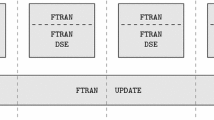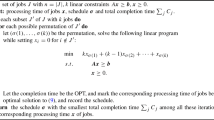Abstract
The partitioned EDF scheduling of implicit-deadline sporadic task systems upon identical multiprocessor platforms is considered. The problem is known to be intractable, but many different polynomial-time algorithms have been proposed for solving it approximately. These different approximation algorithms have previously been compared using utilization bounds; they are compared here using a different metric—the speedup factor. It is shown that from the perspective of their speedup factors, the best partitioning algorithms are those that (i) assign the tasks in decreasing order of utilization; and (ii) are “reasonable” in the sense that they will assign a task if there is capacity available on some processor—such algorithms include the widely-used First-Fit Decreasing, Best-Fit Decreasing, and Worst-Fit Decreasing partitioning heuristics.
Similar content being viewed by others
Notes
Actually, the result in Hochbaum and Shmoys (1987) was expressed in terms of minimizing the makespan of a given finite collection of non-preemptive jobs; however, the makespan minimization problem considered in Hochbaum and Shmoys (1987) is easily shown to essentially be equivalent to the partitioning problem we are interested in this paper. Details of this relationship are explicitly spelled out in Chattopadhyay and Baruah (2011).
Indeed, there seems to be no reason why a system designer would ever consider using a non-RA partitioning algorithm.
At the extreme, a partitioning algorithm with speedup factor one is optimal.
To see that such a swap is permissible, we note that τ i is the task with largest utilization with index≥i. Hence the other task on P j in OPT, if present, will be of utilization ≤u i , and can therefore be accommodated in the capacity that OPT had assigned to τ i on P k . And, we conclude that τ i can be accommodated on P j by observing that RAD had made exactly this assignment.
References
Baruah S, Burns A (2006) Sustainable scheduling analysis. In: Proceedings of the IEEE real-time systems symposium, Rio de Janeiro, December 2006. IEEE Comput Soc, Los Alamitos, pp 159–168
Baruah S, Cohen N, Plaxton G, Varvel D (1996) Proportionate progress: a notion of fairness in resource allocation. Algorithmica 15(6):600–625
Chattopadhyay B, Baruah S (2011) A lookup-table driven approach to partitioned scheduling. In: Proceedings of the IEEE real-time technology and applications symposium (RTAS), Chicago. IEEE Comput Soc, Los Alamitos
Coffman EG Jr, Garey MR, Johnson DS (1997) Approximation algorithms for bin packing: a survey. In: Approximation algorithms for NP-hard problems. PWS-Kent, Boston, pp 46–93
Dertouzos M (1974) Control robotics: the procedural control of physical processors. In: Proceedings of the IFIP Congress, pp 807–813
Graham R (1969) Bounds on multiprocessor timing anomalies. SIAM J Appl Math 17:416–429
Hochbaum D, Shmoys D (1987) Using dual approximation algorithms for scheduling problems: theoretical and practical results. J ACM 34(1):144–162
Kalyanasundaram B, Pruhs K (2000) Speed is as powerful as clairvoyance. J ACM 37(4):617–643
Liu C, Layland J (1973) Scheduling algorithms for multiprogramming in a hard real-time environment. J ACM 20(1):46–61
Lopez JM, Diaz JL, Garcia DF (2004) Utilization bounds for EDF scheduling on real-time multiprocessor systems. Real-Time Syst 28(1):39–68
Lupu I, Courbin P, George L, Goossens J (2010) Multi-criteria evaluation of partitioning schemes for real-time systems. In: 2010 IEEE conference on emerging technologies and factory automation (ETFA), pp 1–8
Acknowledgements
This research is supported in part by NSF grants CNS 0834270, CNS 0834132, and CNS 1016954; ARO grant W911NF-09-1-0535; AFOSR grant FA9550-09-1-0549; and AFRL grant FA8750-11-1-0033.
Author information
Authors and Affiliations
Corresponding author
Rights and permissions
About this article
Cite this article
Baruah, S. Partitioned EDF scheduling: a closer look. Real-Time Syst 49, 715–729 (2013). https://doi.org/10.1007/s11241-013-9186-0
Published:
Issue Date:
DOI: https://doi.org/10.1007/s11241-013-9186-0




